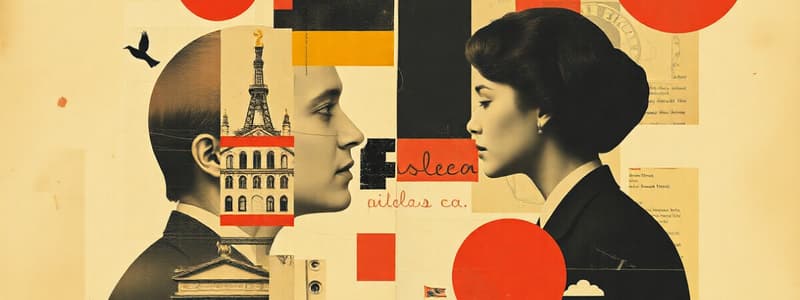Podcast
Questions and Answers
What defines a social group?
What defines a social group?
- Individuals united by similar characteristics who frequently interact. (correct)
- A collection of individuals with no territorial proximity.
- People with a shared characteristic who never interact.
- A grouping of strangers gathered in a common area.
What is the primary distinction between in-groups and out-groups?
What is the primary distinction between in-groups and out-groups?
- In-groups are always larger than out-groups.
- In-groups consist of temporary associations, whereas out-groups are permanent.
- In-groups have positive attributes, while out-groups are viewed negatively. (correct)
- Out-groups have defined characteristics that members cannot share.
What role do reference groups play in shaping individual behavior?
What role do reference groups play in shaping individual behavior?
- They represent the out-groups to contrast with in-groups.
- They are primarily concerned with enforcing group norms.
- They serve as a standard for measuring personal actions. (correct)
- They discourage conformity to societal norms.
Which type of group is characterized by formal roles and limited interactions?
Which type of group is characterized by formal roles and limited interactions?
What is an example of an informal negative sanction?
What is an example of an informal negative sanction?
How are social aggregates defined?
How are social aggregates defined?
Which characteristic is NOT associated with instrumental leaders?
Which characteristic is NOT associated with instrumental leaders?
What is fundamental to the concept of social networks?
What is fundamental to the concept of social networks?
What do social roles contribute to in an individual's behavior?
What do social roles contribute to in an individual's behavior?
Which category of norms includes behaviors considered completely forbidden?
Which category of norms includes behaviors considered completely forbidden?
What is the primary function of laws in society?
What is the primary function of laws in society?
What does deviance from social norms typically result in?
What does deviance from social norms typically result in?
How does internalization affect an individual's relationship with social norms?
How does internalization affect an individual's relationship with social norms?
Which of the following best describes formal negative sanctions?
Which of the following best describes formal negative sanctions?
What role do folkways play in society?
What role do folkways play in society?
What is conformity generally met with in society?
What is conformity generally met with in society?
Study Notes
Role Theory and Social Behavior
- Individuals learn social roles from their society and reproduce these roles in their actions.
- These roles are social facts that influence, inhibit, and empower an individual.
- Examples of social facts include: gender roles, occupational roles, and family roles.
Symbolic Interactionism
- Individuals construct their sense of self through social interactions within a society.
Norms
- Socially approved behaviors can be categorized into four types: folkways, mores, taboos, and laws.
- Folkways are socially approved behaviors without a moral underpinning, based on customs and conventions
- Mores are related to moral conventions and are considered acceptable in relation to religious practices.
- Taboos are forbidden behaviors in a specific culture and are met with stricter punishments.
- Laws are rules and regulations enforced by the state, representing a primary source of social control.
Conformity and Deviance
- Conformity is following societal roles and goals, often met with rewards and acceptance.
- Deviance violates prescribed social norms and is often associated with a stigma, which is a strong sense of disapproval of nonconforming behavior.
Internalization and Sanctions
- Internalization is the process of incorporating social norms into an individual's personality, leading to automatic conformity.
- Sanctions encourage conformity through rewards or punishments.
- Formal positive sanctions are rewards given by institutions to encourage conformity. (e.g., academic honors)
- Formal negative sanctions are punishments given by institutions to enforce conformity. (e.g., imprisonment for a crime)
- Informal positive sanctions are rewards given by individuals or groups to encourage conformity. (e.g., a standing ovation)
- Informal negative sanctions are punishments given by individuals or groups to discourage nonconformity. (e.g., gossiping)
Social Groups
- A social group consists of individuals united by similar characteristics that form the basis of their interactions
- Social categories are individuals sharing similar characteristics but may not necessarily interact.
- Social aggregates are individuals gathered in a location, but are neither interacting nor sharing similar characteristics (e.g., people in a shopping mall).
Social Networks
- Social networks consist of individuals connected through dyadic relationships within a structure.
In-Groups and Out-Groups
- In-groups are social groups an individual identifies with and expresses loyalty to.
- Out-groups are groups an individual does not belong to, and often negative attributes are associated with their members regardless of their actions.
Reference Groups
- A reference group is a group whose behaviors and beliefs an individual considers ideal, serving as a standard to measure their actions.
Primary and Secondary Groups
- Primary groups are direct sources of social skills and knowledge, and bonds with members are long-lasting. (e.g., family, friends, peers).
- Secondary groups are formal in context, with relationships defined by the roles within the group. (e.g., colleagues at work).
Group Behavior
- Instrumental leaders implement a directive style of management, directing group members to perform tasks for achieving group goals.
- These leaders are achievement-motivated, prioritizing the purpose of the group and the individuals' roles in accomplishing it.
Studying That Suits You
Use AI to generate personalized quizzes and flashcards to suit your learning preferences.
Description
Explore the concepts of role theory, symbolic interactionism, and social norms in sociology. This quiz delves into how individuals learn and reproduce social roles and the various types of norms governing behavior. Test your understanding of conformity, deviance, and the implications of social facts in societal behavior.




